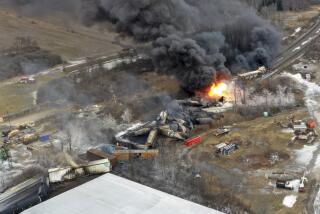Industries Plan Terror Recovery
- Share via
LAS VEGAS — Big utilities and the transportation, communication and oil industries are resigned that they will not be able to fully protect themselves from terrorist attack, but are confident they could recover sufficiently to function in the wake of one, homeland security officials were told Thursday.
The same factor that makes them most vulnerable -- a network of widely dispersed assets -- also allows them to circumvent interruptions, whether the target is railroad lines, fiber optics cables or oil pipelines, industry representatives told a conference sponsored by the Western Governors’ Assn. and the federal Critical Infrastructure Assurance Office.
The nation’s financially strapped towns and cities face their own problems in responding to terrorism because the federal government has not provided funding to bolster local emergency services, one speaker complained.
“We still face enormous needs,” said Mary Poss, a Dallas city councilwoman and co-chair of the homeland security task force of the National League of Cities. Last month’s passage of the Homeland Security Act provided no funding for local emergency crews, she noted, “and cities were very disappointed.”
If local governments make homeland security a priority, without federal aid they will have to eliminate other public services, Poss said.
Other speakers warned of continuing shortfalls in communications that will handicap public agencies and private industry in the event of a catastrophic attack.
Challenges as basic as gaining quick approval to move machines and equipment past police and fire lines -- or allowing Canadian utility workers to reinforce local crews in the Northwest -- still confront emergency planners, said Washington state legislator Jeff Morris.
Frank Ianna, president of AT&T; Network Services, said the company has four fleets of tractor-trailers around the country filled with switching equipment and other hardware needed to repair and replace stricken facilities.
The company is planning a similar strategy for overseas because there are no assurances, he said, that the company will be able to fly equipment anywhere after an attack.
Utilities debate how much equipment should be placed in reserve, said Terry Winter, president of the California Independent Systems Operator, which oversees the transmission of electricity through much of the state.
“There’s no way we have enough people or money to protect the entire system,” he said. But because the state’s grid is already designed to withstand earthquakes, electricity would similarly be rerouted in the event of an attack, he said to the audience of 250.
Western governors will hold another session today to identify which issues -- including health care, forest management and energy development -- they want Washington to address in 2003.
More to Read
Inside the business of entertainment
The Wide Shot brings you news, analysis and insights on everything from streaming wars to production — and what it all means for the future.
You may occasionally receive promotional content from the Los Angeles Times.










